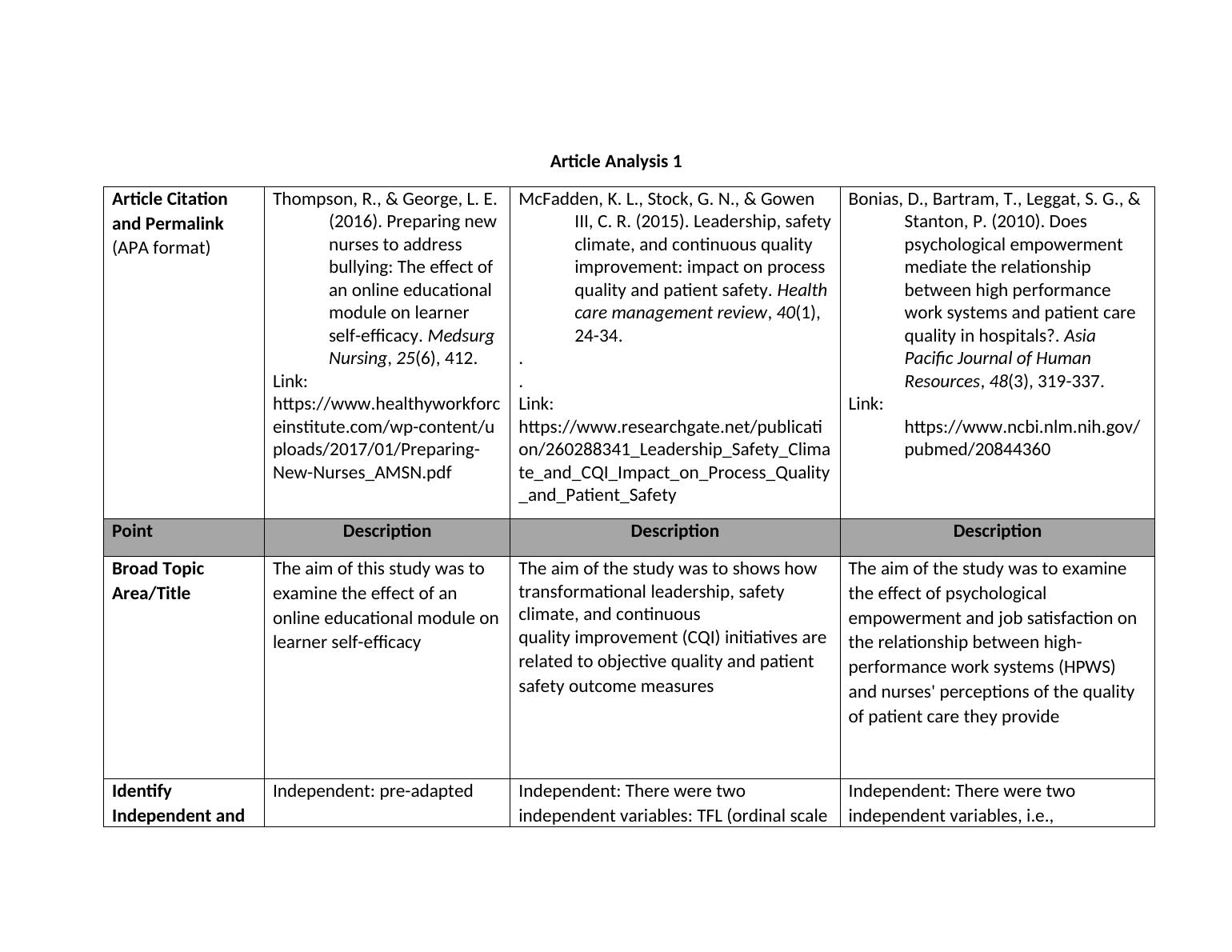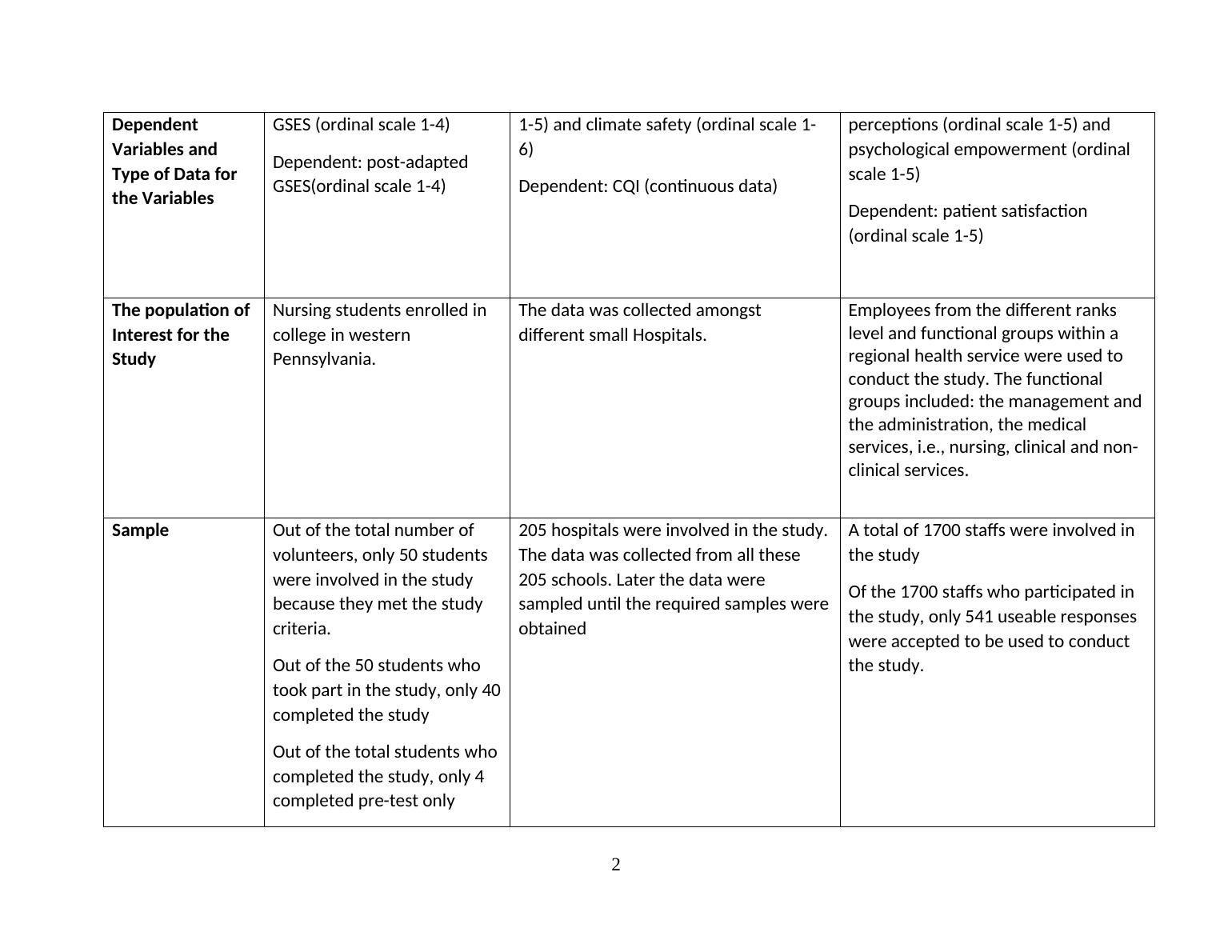Effect of Online Educational Module on Learner Self-Efficacy
Added on 2023-02-01
4 Pages937 Words65 Views
Article Analysis 1
Article Citation
and Permalink
(APA format)
Thompson, R., & George, L. E.
(2016). Preparing new
nurses to address
bullying: The effect of
an online educational
module on learner
self-efficacy. Medsurg
Nursing, 25(6), 412.
Link:
https://www.healthyworkforc
einstitute.com/wp-content/u
ploads/2017/01/Preparing-
New-Nurses_AMSN.pdf
McFadden, K. L., Stock, G. N., & Gowen
III, C. R. (2015). Leadership, safety
climate, and continuous quality
improvement: impact on process
quality and patient safety. Health
care management review, 40(1),
24-34.
.
.
Link:
https://www.researchgate.net/publicati
on/260288341_Leadership_Safety_Clima
te_and_CQI_Impact_on_Process_Quality
_and_Patient_Safety
Bonias, D., Bartram, T., Leggat, S. G., &
Stanton, P. (2010). Does
psychological empowerment
mediate the relationship
between high performance
work systems and patient care
quality in hospitals?. Asia
Pacific Journal of Human
Resources, 48(3), 319-337.
Link:
https://www.ncbi.nlm.nih.gov/
pubmed/20844360
Point Description Description Description
Broad Topic
Area/Title
The aim of this study was to
examine the effect of an
online educational module on
learner self-efficacy
The aim of the study was to shows how
transformational leadership, safety
climate, and continuous
quality improvement (CQI) initiatives are
related to objective quality and patient
safety outcome measures
The aim of the study was to examine
the effect of psychological
empowerment and job satisfaction on
the relationship between high-
performance work systems (HPWS)
and nurses' perceptions of the quality
of patient care they provide
Identify
Independent and
Independent: pre-adapted Independent: There were two
independent variables: TFL (ordinal scale
Independent: There were two
independent variables, i.e.,
Article Citation
and Permalink
(APA format)
Thompson, R., & George, L. E.
(2016). Preparing new
nurses to address
bullying: The effect of
an online educational
module on learner
self-efficacy. Medsurg
Nursing, 25(6), 412.
Link:
https://www.healthyworkforc
einstitute.com/wp-content/u
ploads/2017/01/Preparing-
New-Nurses_AMSN.pdf
McFadden, K. L., Stock, G. N., & Gowen
III, C. R. (2015). Leadership, safety
climate, and continuous quality
improvement: impact on process
quality and patient safety. Health
care management review, 40(1),
24-34.
.
.
Link:
https://www.researchgate.net/publicati
on/260288341_Leadership_Safety_Clima
te_and_CQI_Impact_on_Process_Quality
_and_Patient_Safety
Bonias, D., Bartram, T., Leggat, S. G., &
Stanton, P. (2010). Does
psychological empowerment
mediate the relationship
between high performance
work systems and patient care
quality in hospitals?. Asia
Pacific Journal of Human
Resources, 48(3), 319-337.
Link:
https://www.ncbi.nlm.nih.gov/
pubmed/20844360
Point Description Description Description
Broad Topic
Area/Title
The aim of this study was to
examine the effect of an
online educational module on
learner self-efficacy
The aim of the study was to shows how
transformational leadership, safety
climate, and continuous
quality improvement (CQI) initiatives are
related to objective quality and patient
safety outcome measures
The aim of the study was to examine
the effect of psychological
empowerment and job satisfaction on
the relationship between high-
performance work systems (HPWS)
and nurses' perceptions of the quality
of patient care they provide
Identify
Independent and
Independent: pre-adapted Independent: There were two
independent variables: TFL (ordinal scale
Independent: There were two
independent variables, i.e.,

Dependent
Variables and
Type of Data for
the Variables
GSES (ordinal scale 1-4)
Dependent: post-adapted
GSES(ordinal scale 1-4)
1-5) and climate safety (ordinal scale 1-
6)
Dependent: CQI (continuous data)
perceptions (ordinal scale 1-5) and
psychological empowerment (ordinal
scale 1-5)
Dependent: patient satisfaction
(ordinal scale 1-5)
The population of
Interest for the
Study
Nursing students enrolled in
college in western
Pennsylvania.
The data was collected amongst
different small Hospitals.
Employees from the different ranks
level and functional groups within a
regional health service were used to
conduct the study. The functional
groups included: the management and
the administration, the medical
services, i.e., nursing, clinical and non-
clinical services.
Sample Out of the total number of
volunteers, only 50 students
were involved in the study
because they met the study
criteria.
Out of the 50 students who
took part in the study, only 40
completed the study
Out of the total students who
completed the study, only 4
completed pre-test only
205 hospitals were involved in the study.
The data was collected from all these
205 schools. Later the data were
sampled until the required samples were
obtained
A total of 1700 staffs were involved in
the study
Of the 1700 staffs who participated in
the study, only 541 useable responses
were accepted to be used to conduct
the study.
2
Variables and
Type of Data for
the Variables
GSES (ordinal scale 1-4)
Dependent: post-adapted
GSES(ordinal scale 1-4)
1-5) and climate safety (ordinal scale 1-
6)
Dependent: CQI (continuous data)
perceptions (ordinal scale 1-5) and
psychological empowerment (ordinal
scale 1-5)
Dependent: patient satisfaction
(ordinal scale 1-5)
The population of
Interest for the
Study
Nursing students enrolled in
college in western
Pennsylvania.
The data was collected amongst
different small Hospitals.
Employees from the different ranks
level and functional groups within a
regional health service were used to
conduct the study. The functional
groups included: the management and
the administration, the medical
services, i.e., nursing, clinical and non-
clinical services.
Sample Out of the total number of
volunteers, only 50 students
were involved in the study
because they met the study
criteria.
Out of the 50 students who
took part in the study, only 40
completed the study
Out of the total students who
completed the study, only 4
completed pre-test only
205 hospitals were involved in the study.
The data was collected from all these
205 schools. Later the data were
sampled until the required samples were
obtained
A total of 1700 staffs were involved in
the study
Of the 1700 staffs who participated in
the study, only 541 useable responses
were accepted to be used to conduct
the study.
2

End of preview
Want to access all the pages? Upload your documents or become a member.
Related Documents
Healthcare. 1. Statistics in Healthcare by. Course: Tutlg...
|4
|480
|30
Article Analysis for Health Care Patientslg...
|4
|1239
|74
Article Analysis for Health Care Patientslg...
|8
|879
|52
Statistical Analysis of Early Life Factors and Academic/Social Adjustment in Childrenlg...
|20
|4070
|296
